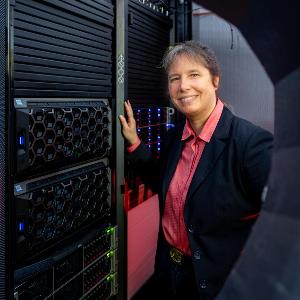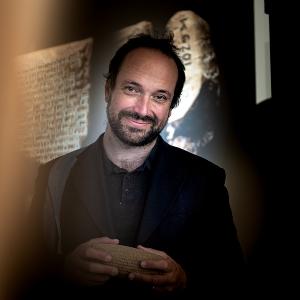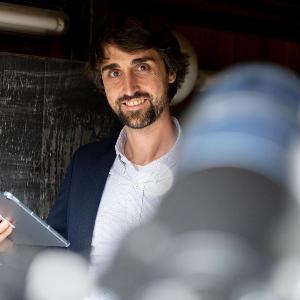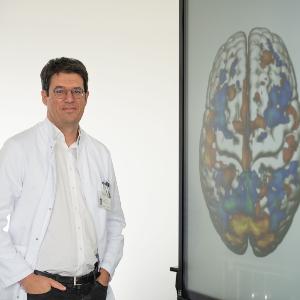How intelligent can AI be?
7 Oct 2021
How is artificial intelligence going to evolve? Where do the challenges lie? Answers from the perspective of different faculties.
7 Oct 2021
How is artificial intelligence going to evolve? Where do the challenges lie? Answers from the perspective of different faculties.
Tuesday, 19 October sees the start of the AI Lectures at LMU. This series of virtual events will shed light on how artificial intelligence (AI) is changing science, society and our lives. But how intelligent can AI actually be? Lecturers from the series answer this question from their professional perspective:

will moderate the panel discussion on the ethical challenges of artificial intelligence as part of the AI Lectures. | © LMU
“As human beings, we have long been used to software systems performing mathematical tasks for us. We are happy to let machines solve simultaneous equations or calculate the shortest path between two points on a map.
But we feel uneasy when machines drive cars, recognize faces or predict our decisions. Such AI-based systems use algorithms inspired by knowledge from the fields of biology and educational psychology. These systems are not intelligent in and of themselves, but with the help of large amounts of computing power they can search and analyze huge quantities of data in seconds.”
Professor Martin Wirsing is Professor of Computer Sciences at LMU and a distinguished expert in programming, software engineering and development.

gives insights into ai in her AI Lecture: Einblicke in die Künstliche Intelligenz: Entscheidungen verstehen und erklären | © LMU
“Current artificial intelligence is based on algorithms executed using the computers available today. These are the two main components that determine ‘how intelligent’ AI is. Let’s compare it with the human brain: Artificial neural networks are algorithmically based on artificial neurons, which are very crude simplifications of the neurons in the brain. And the human brain is so much more flexible in creating new connections between neurons that it’s almost impossible to compare with what current hardware can do. A child only needs to have seen a few cats and dogs in order to be able to tell the difference between those animals. But an artificial neural network needs millions of images to be able to perform this task, even though it’s so simple for humans.
The new research field of neuromorphic computing is one that is particularly moving in the right direction here. Nevertheless, we are still decades away from human levels of intelligence.”
Professor Gitta Kutyniok holds the Chair for Mathematical Foundations of Artificial Intelligence in the Faculty of Mathematics, Computer Science and Statistics.

will hold a lecture about “Reconstructing the masterpieces of ancient Near Eastern literature with the help of artificial intelligence“. | © LMU
"The ancient world is a gigantic mosaic of which only a few tesserae are known to us today. Researchers must use what little they have in order to reconstruct what the missing gaps may have contained. The literature that has survived from ancient Mesopotamia is also extremely fragmented, and the reconstruction is far from finished: every year new fragments, large and small, come to light, which add to our knowledge, sometimes significantly.
The ways in which fragments are identified by researchers are slow and inefficient. That is why we are currently harnessing AI to automate and dramatically accelerate the reconstruction in our research work. AI can determine the correct reading of a sign in its context or identify signs on photos with often startling, even unsettlingly accurate, results; but it cannot establish, for instance, which aspects of a certain text are worth studying, or interpret a historical event. But then again, this may change as technology evolves."
Professor Enrique Jiménez is Professor of Ancient Near Eastern Languages at the Institute for Assyriology and Hethitology in the Faculty for the Study of Culture at LMU.

talks about “Artificial Intelligence in Cosmology“ in his AI Lecture | © LMU
“Can artificial intelligence do research and discover something? Learning algorithms have crucial advantages in terms of their ability to process large amounts of data, detect patterns and correlations, and build models of what the data looks like. In observation-based cosmology, one of the most fundamental disciplines of the natural sciences, such algorithms are already indispensable tools.
Where it gets more difficult is with causal relations, and indeed with anything else that goes beyond pure phenomenology. Discovery is more than the combination of known possibilities. It still seems transcendent and reserved for humankind. Does it have to be that way? What would it look like if a machine were to shout ‘Eureka’?”
Professor Daniel Grün holds the Chair of Astrophysics, Cosmology and Artificial Intelligence in the Faculty of Physics at LMU.

holds a lecture about “Who Decides What Counts? AI and Big Data: Applications in Economic and Social Science Research“ | © LMU
"A lot has been said about how the ability to be creative in a uniquely human way serves as a limit to AI “intelligence”, and I don’t disagree. However, as a data scientist, I also think about how data quality and availability play key and continuing roles in how capable, how intelligent, AI systems can be.
Much like a child’s environment is a critical component in their cognitive development, the same holds true for AI systems and the effect of the quality of data that shapes it."
Professor Frauke Kreuter holds the chair of Statistics and Data Science in the Social Sciences and Humanities and is co-director of the Data Science Centers at the University of Maryland and the University of Mannheim.

will cover the latest developments in AI techniques in clinical neuroscience in his AI lecture | © LMU
“The answer to this question depends on how we define intelligence. If we see intelligence as the ability of humans to form complex, abstract, creative and dynamically changing concepts about reality from sensory input and to develop an awareness of this, then today’s AI can at best simulate individual aspects of this process.
If, on the other hand, we see intelligence as the ability to recognize connections between pieces of information and to apply the resulting decision patterns to new situations, then we can already ascribe a form of intelligence to today’s ‘weak’ AI.”
Nikolaos Koutsouleris holds the Chair in Precision Psychiatry in the Department of Psychiatry at LMU and at the Institute of Psychiatry, Psychology and Neuroscience, King’s College London. He practices as a specialist in Psychiatry and Psychotherapy with a focus on Youth Mental Health at the University of Munich Hospital.

takes part in the discussion about ethical challenges posed by artificial intelligence | © LMU
“Artificial intelligence is neither particularly intelligent, nor clever, nor moral. But it is incredibly powerful and efficient. And this makes the technology doubly interesting for the field of ethics. For one thing, AI does not itself act in a moral way, it does not discriminate, and it has no moral intentions of its own. It comes down to how we humans have constructed and trained it. On the other hand, you never get technology that is not normative or unbiased, because it always serves a certain purpose and influences our way of life, directly or indirectly. Against this backdrop, AI remains one of the most exciting technologies of our times: It can do many things better and more efficiently than we humans can, with the result that it may even be morally imperative for us to use it. But at the same time, it is merely a technical artifact, it makes mistakes, and it does not reflect on what it has done, so we humans bear the responsibility for how we design and use it.”
Dipl.sc.pol.Univ. Timo Greger, M.A. is Scientific Coordinator and joint leader of the project “AI and Ethics – Ethical Challenges Through Artificial Intelligence” within the AI Campus project platform.
AI Lectures (in German): View the program and register here